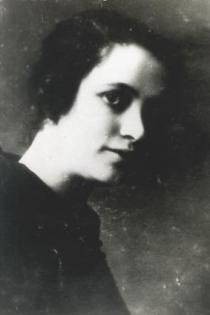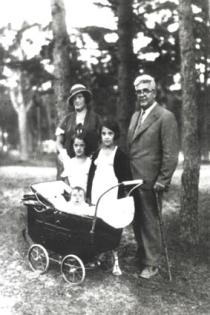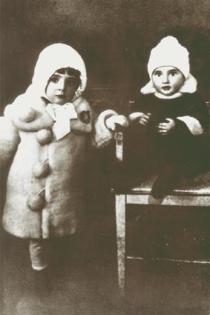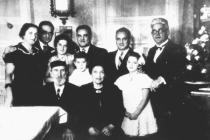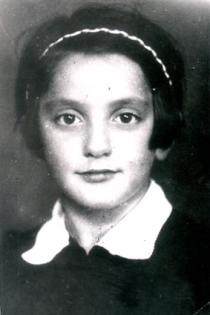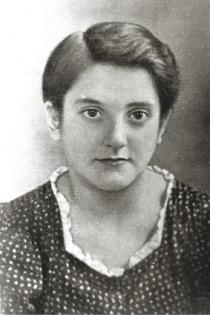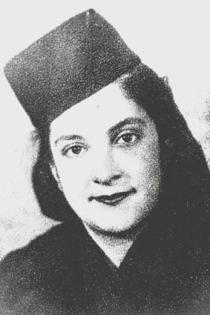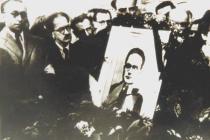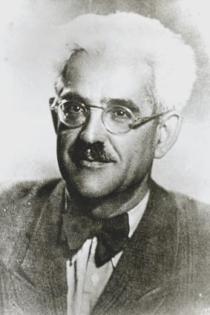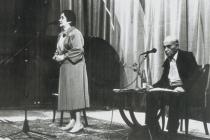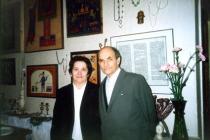The photo was taken in 1937 or 1938 in Shaulay during the wedding ceremony of my father's sister. It was taken by a specially invited photographer. You can see my father standing first from right, his brothers (from right to left) Meir, Berl, and Mikhey. My Mum is standing first from left, Miriam is next to her. The girl in white dress is me. The little boy is not our relative: he only assisted me in carrying the bride’s train. My paternal grandfather and grandmother are sitting.
Unfortunately I know nothing about my great-grandfathers and great-grandmothers. I know only that they all came from Lithuania. Daddy used to say that his grandfather was a water carter, but possibly it was a joke. Most of my relatives lived in the small shtetl Plunge near Klaypeda. [Klaypeda is the third large city in Lithuania, it is situated near the Baltic sea on both sides of the River Dane]. I remember that my paternal grandmother's name was Hana Rolnikene.
My paternal grandfather's name was Itsik Abel Rolnik. In Polish rolnik means a farmer, but as far as I know there were no farmers among our family members. He was an old religious Jew wearing beard and observing traditions. He was an owner of a small shop. My grandmother Hana was very vigorous and witty. She gave birth to 10 children and brought all of them up. Unfortunately not all of her children survived: some of them died before the war. At the beginning their shop was very small: buttons, ribbons, etc. (dry goods). Later they added fabrics and finished articles. Grandmother told me that under the counter she had a wooden bucket (where women used to wash linen). In that bucket she kept her baby, she rocked that makeshift cradle with her foot and sold goods at the same time. The only break she had was a short time in small pantry to breast-feed her baby. That was the way she brought up her children!
My grandfather was religious: he attended synagogue. By nature he was very silent and sedate, and my grandmother (on the contrary) was very witty. Here is an example. She had got a brother who lived in the neighboring city. He used to send her letters, but wrote a miserable scratch. Therefore my grandmother sent him the following message: come to our place and read your letter!
Grandmother and grandfather sent my father to cheder, when he became 12 years old. It was situated in the neighboring small town. But Daddy quickly got disappointed in it and came home afoot. Later he finished a secondary school and went to Riga to study in gymnasia. Parents were able to buy him a black suit and a tie and that was all. He went to Riga having no money. Therefore Daddy worked as a porter and as a loader. When his trousers became full of holes, he made patches from his tie. He managed to finish that gymnasia in Riga (for some reason it appeared to be a Russian gymnasia). Daddy decided to become a lawyer and study at a university in Germany. He sent 12 applications to 12 universities and received 12 refusals. Nevertheless he left for Berlin and managed to press for an audience with one of rectors.
It is funny that a postage stamp played the decisive role in the way he became a student. Daddy came to that rector, said that he was from Lithuania and wanted to enter the University. The rector asked 'Are you from Lithuania? Recently we had differences with my colleague regarding Lithuania and Latvia. Is it the same state?' Daddy answered that it was not true, that he had a letter from his parents with a stamp of Lithuania. After that the rector allowed Daddy to become an external student. Later he passed through examinations and became an internal student. He studied in Berlin and Leipzig. He graduated from the faculty of law and later from the College of German Language and Literature which prepared teachers of German language and literature for foreigners. I asked him 'Daddy, what for?' And he answered 'It was very interesting for me.' But the knowledge of German language appeared to be very useful, because later we got a nanny from Germany and she spoke German with us. It is useful for me now, too (many years later). Some time ago it seemed to me that I forgot everything. But when they published my book in Germany, I went there and spoke poor German, but managed to answer questions. By the way I read my manuscript in Yiddish (according to their request).
Mom was a housewife. She had four children and trembled over us like every Jewish mother. Her name was Tayber Koganayte.

